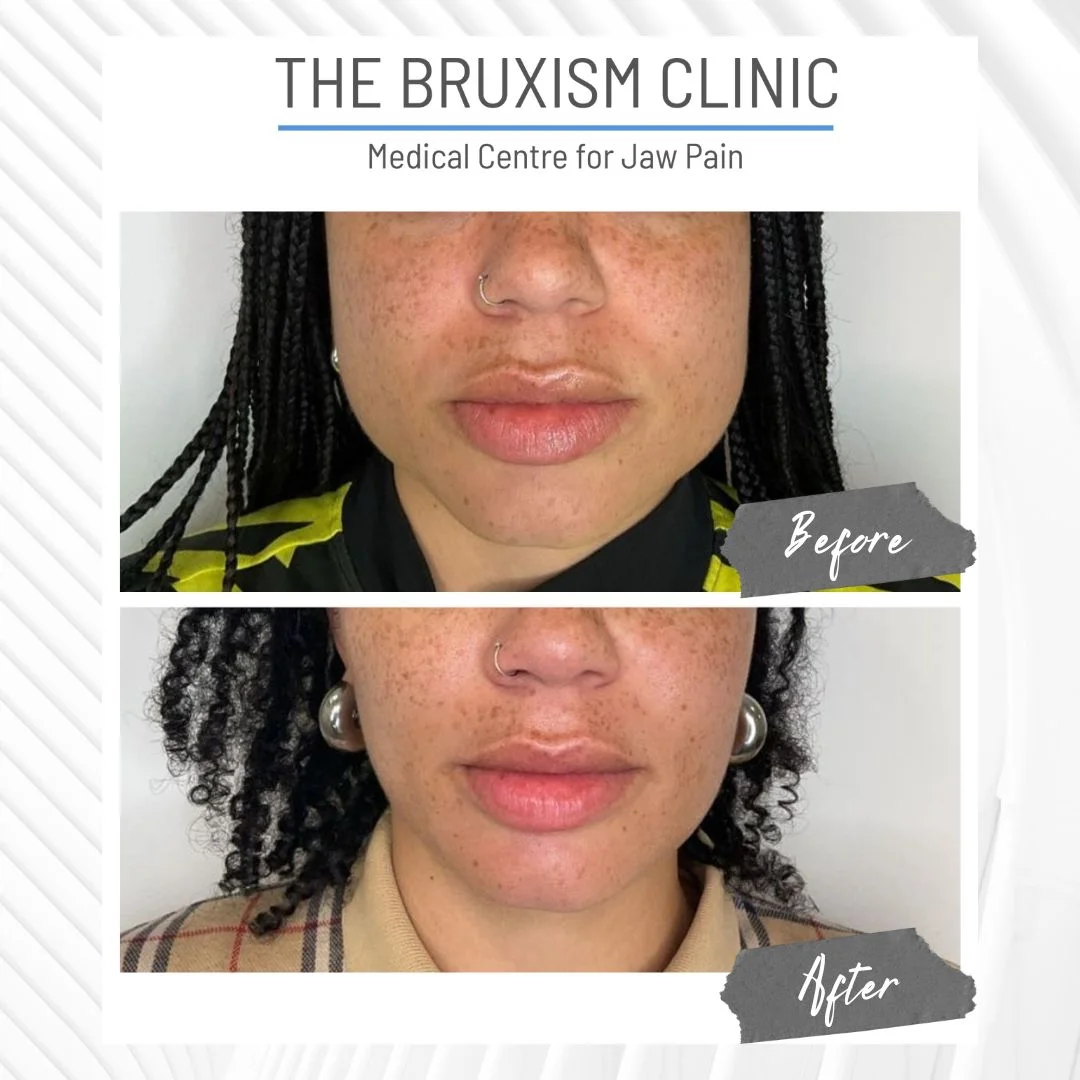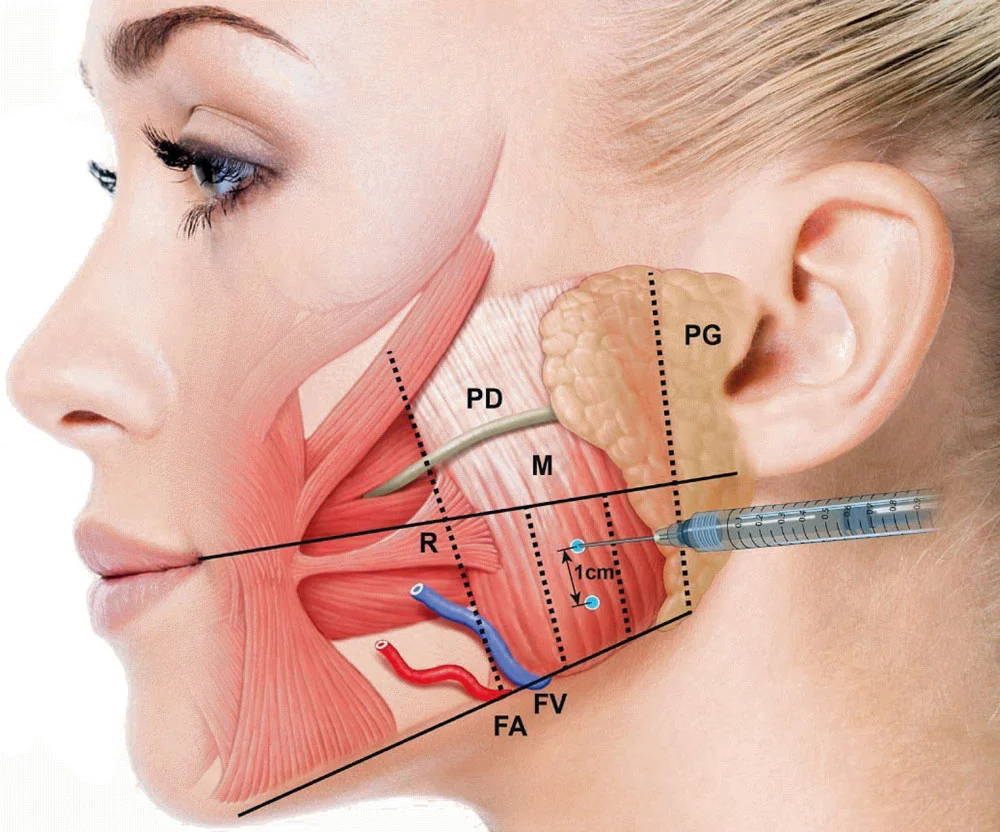Botox treatment can drastically reduce teeth grinding and jaw clenching by relaxing the masseter muscle.
Wondering how our medically led Botox treatments could improve your Bruxism? Speak to our team today.



"*" indicates required fields
Bruxism is a painful condition that affects 18% of the population and is often untreated. Most people probably grind and clench their teeth from time to time and may not need any treatment.
But when teeth grinding and clenching is occurring more frequently, it can damage the teeth and cause unwanted symptoms. People suffering from this condition are often unaware of its existence because the involuntary teeth grinding and clenching usually occurs at night when they are asleep (sleep bruxism) or subconsciously during the day (awake Bruxism)
Bruxism doesn’t have one definite cause. Most often, the cause of Bruxism from one person to the next differs. For example, Bruxism is often linked to stress, whereby some people will clench their teeth when anxious, angry, or stressed. There has been a steep rise in Bruxism during the Covid 19 Pandemic due to all the additional stress.
Sleep Bruxism is sometimes attributed to sleeping disorders or genetics, which means it may run in the family. Other probable causes of Bruxism include medication side effects, malocclusion, but further research is needed to understand the possible causes of Bruxism better.
Medication associated with Bruxism includes antipsychotics and Selective Serotonin Reuptake inhibitors. A recent study shows it most commonly associated with Fluoxetine, Venlafaxine and Sertraline. It typically starts around 3-4 weeks after medication.

4 Injections either side directly into the Masseter Muscle. These are less painful then a blood test. Results start in 2 weeks with optimal improvements at 4 weeks where a follow up is included with additional dose adjustment if needed.
Here at Dr. Aesthetica, we suggest using Botox to treat Bruxism. Multiple studies have shown that botulinum toxin (Botox) injections can reduce the pain and frequency of teeth grinding and teeth clenching while also relieving the stress in the surrounding masseter muscle. Botox works by relaxing the jaw muscles, which in turn results in less clenching or grinding of teeth and significantly less pain. Patients often report a significant improvement of symptoms within a week and report having the “best sleep in ages.”
Botulinum toxin is a safe and effective treatment for patients who grind or clench their teeth, develop temporal-mandibular joint (TMJ) pain, or have masseter hypertrophy (wide and square-shaped jawline).

Bruxism, or teeth grinding, can occur both during sleep (sleep bruxism) and while awake (awake bruxism). The symptoms of bruxism can vary widely and may include:
1. Jaw Pain and Stiffness: Persistent pain or discomfort in the jaw muscles, especially upon waking.
2. Headaches: Frequent morning headaches, often starting at the temples.
3. Tooth Damage: Wear and tear, chipped or fractured teeth, and increased tooth sensitivity.
4. Ear Pain: Pain or a feeling of fullness in the ears.
5. Sleep Disruptions: Disturbed sleep for the individual or their partner due to grinding noises.
6. Facial Pain: Generalized pain or soreness in the face and temples.
7. TMJ Disorders: Issues with the temporomandibular joint, causing pain and restricted movement.
These symptoms can range from mild to severe and may lead to more significant dental and health issues if left untreated. If you suspect you have bruxism, consulting with a specialist like those at the Bruxism Clinic at Dr. Aesthetica can help in diagnosing and managing the condition effectively.
Use Botox to relieve the pain of Bruxism, headaches, Jaw Clenching and Teeth Grinding
| Treatment Name | Price |
| Bruxism Botox (incl 4 weeks follow up) | 375 |
Yes, Botox is effective for relaxing your jaw muscles to prevent jaw clenching. If you suffer chronic headaches or migraines due to jaw clenching, Botox injections can often dramatically reduce the frequency and severity of your headaches.
Injecting small doses of Botox (botulinum toxin) directly into the masseter muscle (the jaw), weakens the muscle enough to stop habitual grinding of the teeth and clenching of the jaw. It brings relief to the TMJ and significantly relaxes the muscle and reduces the wear and tear on the teeth due to bruxism (the action of clenching or grinding).
At Dr Aesthetica, each patient has a 4 week follow up where additional botox is added. We find that our patients typically find the treatment last around 5 months. We advise between 4- 6 months depending on individual symptoms.
Yes, Botox has proven to be one of the most effective treatment options for TMJ disorder. If you’ve suffered with chronic TMJ pain for months or even years, Botox is a great option for you!
Every patient has individual concerns and there are risks with this treatment as there is with any injectable treatment. With any needle, there is a risk of redness, swelling, bruising and pain. Less common side effects include sagging of the skin (more present around Jowls) and possible smile change.
Short Answer YES. In reality, often a very long time scale. We have been seen more patients who are awaiting assessment and treatment from NHS services. There is a significant backlog and the NHS service has been unable to cope with demand. Patients are often told 1-2 years before assessment. There are numerous patients who have treatment previously and are now unable to continue due to lack of appointments.
This treatment is suitable to those who have had little benefit from a mouth guard (Michigan splint or occlusal splint). It can be beneficial for those with persistent bruxism problems. Take our Quiz here to find out if you have Bruxism
We often get asked what the best treatment from bruxism is. There is no proven treatment for bruxism though some advise home remedies for Bruxism. We often advise a variety of different combinations of treatments such as Botox in the jaw muscles (masseter muscle near TMJ) and appliances such as a Tanner mouthguard or a Michigan mouthguard to protect the teeth. We may also recommend medication in some cases.
Botox for jaw clenching and grinding teeth at Dr Aesthetica Birmingham has a fixed cost of £375. This includes a 4 week review where additional botox may be needed to get the required results. We have a 95% success rate for teeth grinding and Jaw clenching Botox. Take your first step to a better quality of life by booking your consultation here
Welcome to the Bruxism Clinic at Dr. Aesthetica, your dedicated specialist clinic for the effective management and treatment of bruxism. Bruxism, commonly known as teeth grinding, is a condition that can lead to numerous dental and health issues if left untreated. At Dr. Aesthetica, we understand the impact bruxism can have on your overall well-being, and our clinic is designed to provide comprehensive care tailored to your needs.
Around 25% of our patients are currently treated for Bruxism. Due to this, we have a specialist website regarding Bruxism Botox. Please see The Bruxism Clinic




